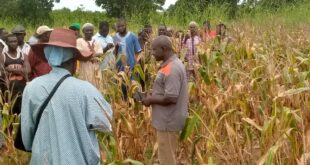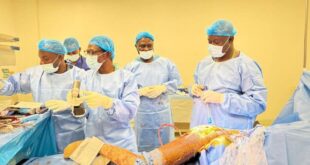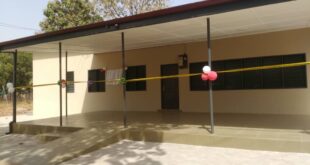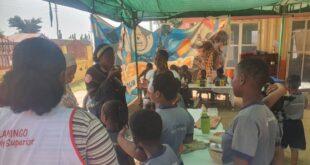Salaga, Ghana – Chief Executive for the Zabzugu District Assembly, Ahmed Abukari Iddrisu, has indicated that there are many lessons for Metropolitan, Municipal and District Assemblies in the Northern Region to learn from the Food Security Through Cooperatives in Northern Ghana (FOSTERING) project.
According to him, the fostering project could serve as a prototype structure on which the entire planting for food and jobs campaign by the Akufo-Addo government would hinge on and be expanded for success.
“There is a lot for us to learn and tying it to the planting for food and jobs…if you look at the entire project embarked by Fostering, you will realise that they (farmers) were taught how to manage funds and how to cultivate certain crops that will enable them have enough food throughout the year and whatever is left they can leave it and sell.
“When we look at planting for food and jobs, eventually we’re trying to have the cache phrase of His Excellency the President of the Republic of Ghana, that Ghana has come of age. That instead of actually exporting raw commodities, we should try to farm, industrialize it and by industrialization, we’re talking about adding value to it”, Mr. Iddrisu said this in an interview with journalists at Salaga in the East Gonja District Assembly at the phasing out ceremony of the FOSTERING project on Wednesday March 28, 2017.
FOSTERING was an 8 million Canadian dollar 5 year project (2013-2018) that established farmer owned and managed credit unions and agricultural cooperative enterprises to deliver the tools farmer members in the Eastern corridor of Northern Ghana needed to become food secure and increase household income.
The project was implemented by SEND Ghana in East Gonja, Kpandai, Nanumba South, Nanumba North, Krachi-Nchumura, Zabzugu, Tatale-Sanguli and Chereponi Districts with funding support from Global Affairs Canada and Cooperative Development Foundation of Canada.
Through FOSTERING, there had been sustainable and gender equitable food security for over 50,000 men and women smallholder farmers and their families in 130 communities in the eight beneficiary districts located in the Eastern Corridor of Northern Ghana.
Women with improved leadership skills have increased twenty-fold and 47 percent of credit union and cooperative leadership positions are now held by women.
Thirty thousand more smallholder farmers now have access to microfinance whereas women have increased their annual income tenfold.
A Development Officer at the Canadian High Commission in Ghana, Majeed Mohammed, said an evaluation of the FOSTERING project concluded this month found that the project met and mostly exceeded its target number of beneficiaries in terms of farmers reached and credit unions.
He noted that, significant achievements had also been recorded in the areas of food security and nutrition as well as income for farming households. “For example, the number of families that have food available for 9-12 months a year increased by 28% between 2013 and 2017 while average annual incomes also increased by 154% for men and 161% for women at the same period”, Mr. Mohammed stated.
Despite the aforementioned achievements, Mr. Mohammed observed that the sustainability of most of the project activities remained a challenge, and called on project partners, government authorities and project beneficiaries to remain engaged and put in every effort to ensure that the investments of the FOSTERING project and the achievements made, benefitted everyone especially women and girls and the vulnerable.
Chief Executive Officer for SEND West Africa, Siapha Kamara, urged farmers who had contracted loans from the various cooperative credit unions to endeavour to pay on time and pay all so that others would benefit.
He also commended Global Affairs Canada, Credit Unions Association of Ghana and the Cooperative Development Foundation of Canada for the partnership and support given to the project for the past 5 years which had yielded enormous results.
By Savannahnewsonline.com
 Savannah News Online Reporting Only What Matters Most
Savannah News Online Reporting Only What Matters Most



